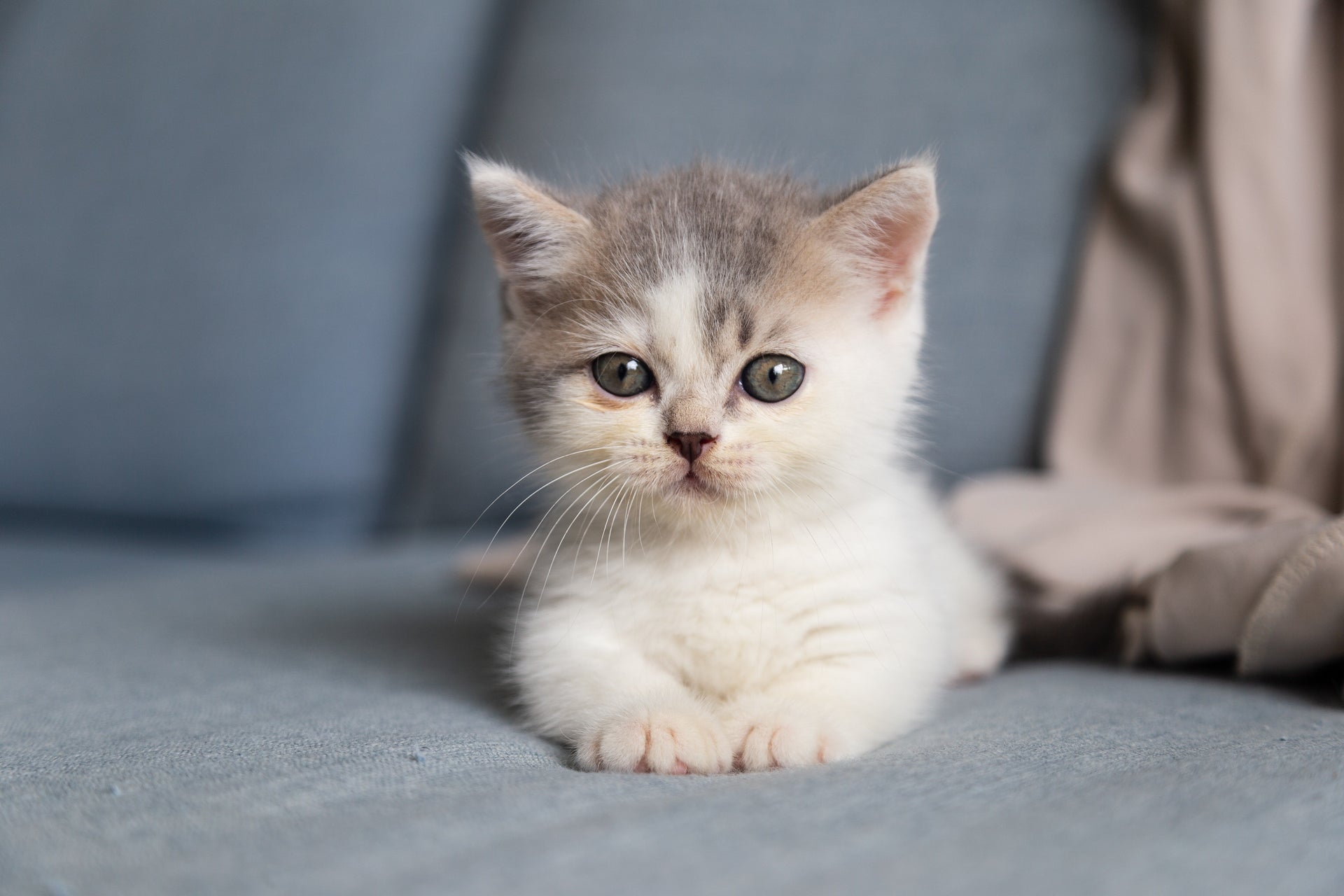Why Does My Kitten Have Diarrhea?
January 16, 2023

Published: January 2023 | Updated: April 2024
Diarrhea in kittens is, unfortunately, a common problem among pet owners. No one wants to see their brand new, adorable kitten sick! The best way to deal with this issue is to understand kitten diarrhea causes and how you can treat it before it becomes an issue.
If your kitten currently has diarrhea and has already become lethargic, skip over this article and consult a veterinarian immediately. At this point, diarrhea is a serious problem and must be treated as soon as possible. If your kitten has only recently started experiencing bouts of diarrhea and is still acting normal, continue reading as usual.
3 Common Causes of Kitten Diarrhea:
1) Viral or Bacterial Infections
If your kitten has diarrhea, it can be caused by a virus or a bacterial infection. Bacterial infections are less common in kittens than viral infections. Bacterial infections can lead to pneumonia, urinary tract infections, and upper respiratory infections.
Some of the most common viruses that cause diarrhea in kittens are:
- Calicivirus (FCV): A type of herpesvirus that causes upper respiratory symptoms similar to those caused by FVR. An FCV-infected cat can shed this virus for up to six weeks after becoming infected; therefore you should avoid contact with any cats who may have recently been exposed to an infected cat or its environment in order to avoid exposure yourself.
- Panleukopenia (also called feline distemper): This highly contagious virus causes diarrhea, vomiting, dehydration and fever. It is especially fatal to young kittens who may not have fully developed their immune system yet. Kittens that survive usually develop lifelong immunity to the virus.
- Upper respiratory infections: Feline viral rhinotracheitis (FVR) is a highly contagious upper respiratory infection caused by a feline herpesvirus. This virus can cause sneezing, watery eyes, nasal discharge and sometimes sneezing fits. The virus usually resolves itself within two weeks, but it can be fatal if it causes secondary bacterial infections or damages the kidneys. Kittens are most affected by this virus, which usually resolves itself as they mature into adulthood.
Infectious agents such as bacteria and viruses are readily transmitted between cats through direct contact with infected feces, saliva, urine and body secretions. The disease may also spread from infected cats to humans or other animals via contaminated hands and food bowls.
2) Intestinal Parasites
Intestinal parasites are a common cause of diarrhea in kittens. Intestinal parasites can be transmitted to your kitten by fleas, or through contact with other cats and dogs that have them. Roundworms, hookworms, tapeworms and other parasites can all cause intestinal distress in cats.
To prevent intestinal parasites, you should make sure that your kitten's environment is clean and free from any potential sources of contamination, including fleas. You should also talk to your veterinarian about treatments for intestinal parasites if you think they may be present in your kitten's system.
3) Feline Leukemia Virus
Feline leukemia virus (FeLV) is a common kitten diarrhea cause. The virus can be found in the blood, lymph nodes and other organs of infected cats. It can be transmitted through blood and saliva, and can also be carried by infected mothers to their babies during pregnancy or while nursing.
The appearance of symptoms depends on how long the cat has been infected with FeLV, so some kittens may show no signs for months after exposure, while others may develop symptoms within a few weeks. Feline leukemia virus can lead to chronic diarrhea that may or may not resolve on its own.
Other signs of feline leukemia include:
- Fever
- Lethargy
- Anemia
- Weight loss
Treatment depends on the severity of the disease and includes supportive care, including fluid therapy if necessary. A course of antibiotics may be used to treat secondary infections such as those caused by bacteria or fungi.
Watch for Dehydration
Dehydration is a serious condition that can occur when kittens lose too much fluid. They need to maintain their hydration levels by drinking enough water and eating foods that contain plenty of fluids.
Dehydration symptoms include:
- Dry mouth and tongue
- Decreased skin elasticity (the skin will feel tight)
- Dark urine with strong odor
How to Stop Kitten Diarrhea For Good!
Here are some tips to help your kitten feel better:
- Keep the litter box fresh and clean. Wash it with soap and water every day or two and add new litter daily.
- Feed your kitten canned food only until her diarrhea stops. If she won't eat canned food, try mixing some canned food with her dry food; gradually add more canned food until she eats only canned food again. If she refuses both types of food, consult your vet about switching to a bland diet that doesn't contain fiber or fat (e.g., boiled chicken and rice).
- If your kitten has worms, keep her away from places where other cats have been (e.g., outdoors). Also consider having your house fumigated if necessary; talk to your veterinarian about this option first before proceeding on your own since there are risks associated with fumigation that must be considered before taking action on your own.
→Highly Recommended: The veterinary-recommended supplement proven to be an important part of keeping kitten diarrhea away.←
What to Feed a Kitten With Diarrhea
Feed them a high-quality diet that contains ingredients with names you recognize and understand, such as chicken and rice instead of "meat by-product meal." Read the ingredient list on any commercial food to make sure it doesn't contain ingredients that could cause diarrhea (such as wheat gluten or soy).
If you must feed a commercial diet, choose one with minimal artificial additives and fillers — most brands have this information on their packaging — or consider making your own food using fresh ingredients from a butcher or farmers market. If you aren’t sure how to get started, look for a feline nutritionist or ask a holistic veterinarian.
Support and Protect the Gut with Kitten Probiotics
Probiotics for diarrhea in kittens, like Daily Cat, are designed to help restore good bacteria that might not be balanced. The idea behind gut health supplements like Daily Cat is simple: Give your kitten's gut some extra help so that he or she can fight off whatever infection they have and start feeling better.
The easiest way to give your kitten probiotics when they aren't feeling well is by giving them a bit of yogurt on the end of a spoon or syringe. You can also mix it into their food if they will eat it that way. If you do this, make sure that you use plain yogurt with no added sugar or flavorings, since these could upset your kitten's stomach.
If your kitten won't eat any yogurt, try mixing the probiotic in with some canned pumpkin that has been mixed with water until it's very thin and runny. The pumpkin will help soothe his stomach as the probiotics do their job to restore their gut.
→Highly Recommended: The veterinary-recommended supplement specifically formulated to support your kitten’s developing digestive system.←
Observe Your Kitten Closely
Diarrhea in cats can be acute (lasting less than 2 weeks) or chronic (lasting more than 2 weeks). The most common cause of diarrhea in cats is an infectious agent such as bacteria, parasites or viruses. Other causes include dietary changes, stress, cancer and liver disease.
Dehydration is an issue for any animal with loose stool because the liquid content of feces contains important electrolytes that are needed for proper organ function and hydration balance.
If your kitten has diarrhea, it is important to keep a close eye on him and try to determine the underlying cause. Diarrhea can lead to dehydration if it persists for more than 24 hours and requires immediate veterinary care.
Do not skip adding probiotics into your kitten’s diet. Daily Cat can be used effectively with antibiotics, should your kitten require treatment. It will also help build and restore the developing gut. Get yours here today!
Read More:
Feline Leukemia Virus Disease Complex

